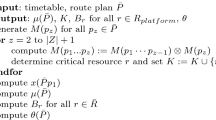Abstract
Delay management determines which connections should be maintained in case of a delayed feeder train. Recent delay management models incorporate the limited capacity of the railway infrastructure. These models introduce headway constraints to make sure that safety regulations are satisfied. Unfortunately, these headway constraints cannot capture the full details of the railway infrastructure, especially within the stations. We therefore propose an optimization approach that iteratively solves a macroscopic delay management model on the one hand, and a microscopic train scheduling model on the other hand. The macroscopic model determines which connections to maintain and proposes a disposition timetable. This disposition timetable is then validated microscopically for a bottleneck station of the network, proposing a feasible schedule of railway operations. We evaluate our iterative optimization framework using real-world instances around Utrecht in the Netherlands.








Similar content being viewed by others
References
Bauer R, Schöbel A (2011) Rules of thumb—practical online-strategies for delay management. Technical report, Institut für Numerische und Angewandte Mathematik
Berger A, Blaar C, Gebhardt A, Müller-Hannemann M, Schnee M (2011) Passenger flow-oriented train disposition. In: Demetrescu C, Halldórsson MM (eds) Algorithms—ESA 2011. Lecture notes in computer science, vol 6942. Springer, Berlin, pp 227–238
Caimi G (2009) Algorithmic decision support for train scheduling in a large and highly utilised railway network. PhD thesis, ETH Zurich, Switzerland
Caimi G, Burkolter D, Herrman T, Chudak F, Laumanns M (2009) Design of a railway scheduling model for dense services. Netw Spat Econ 1(9):25–46
Corman F, D’Ariano A, Pacciarelli D, Pranzo M (2009) Evaluation of green wave policy in real-time railway traffic management. Transp Res Part C 17(6):607–616
Corman F, D’Ariano A, Pacciarelli D, Pranzo M (2010) Bi-objective conflict detection and resolution in railway traffic management. Transp Res Part C 20(1):79–94
Corman F, D’Ariano A, Pacciarelli D, Pranzo M (2012) Optimal inter-area coordination of train rescheduling decisions. Transp Res Part E Logist Transp Rev 48(1):71–88
Corman F, D’Ariano A, Pranzo M, Hansen I (2011) Effectiveness of dynamic reordering and rerouting of trains in a complicated and densely occupied station area. Transp Plan Technol 34(4):341–362
D’Ariano A, Corman F, Pacciarelli D, Pranzo M (2008) Reordering and local rerouting strategies to manage train traffic in real-time. Transp Sci 42(4):405–419
D’Ariano A, Pacciarelli D, Pranzo M (2007) A branch and bound algorithm for scheduling trains in a railway network. Eur J Oper Res 183(2):643–657
De Giovanni L, Heilporn G, Labbé M (2008) Optimization models for the single delay management problem in public transportation. Eur J Oper Res 189(3):762–774
Delorme X, Gandibleux X, Rodriguez J (2009) Stability evaluation of a railway timetable at station level. Eur J Oper Res 3(195):780–790
Dollevoet T, Huisman D (2013) Fast heuristics for delay management with passenger rerouting. Pub Transport. doi:10.1007/s12469-013-0076-6
Dollevoet T, Huisman D, Schmidt M, Schöbel A (2012) Delay management with rerouting of passengers. Transp Sci 46(1):74–89
Dollevoet T, Schmidt M, Schöbel A (2011) Delay management including capacities of stations. In: Caprara A, Kontogiannis S (eds) 11th workshop on algorithmic approaches for transportation modelling, optimization, and systems. OpenAccess series in informatics (OASIcs), vol 20. Schloss Dagstuhl–Leibniz-Zentrum fuer Informatik, pp 88–99
Gatto M, Jacob R, Peeters L, Widmayer P (2007) On-line delay management on a single train line. In: Algorithmic methods for railway optimization, vol 4359. Lecture notes in computer science. Springer, Berlin, pp 306–320
Hansen, IA, Pachl, J (eds) (2008) Railway timetable and traffic: analysis, modelling and simulation. Eurailpress, Hamburg
Hooghiemstra JS, Kroon LG, Odijk MA, Salomon M, Zwaneveld PJ (1999) Decision support systems support the search for win–win solutions in railway network design. Interfaces 29(2):15–32
Kettner M, Sewcyk B, Eickmann C (2003) Integrating microscopic and macroscopic models for railway network evaluation. In: Proceedings of the European transport conference 2003
Kliewer N, Suhl L (2011) A note on the online nature of the railway delay management problem. Networks 57(1):28–37
Krumke S, Thielen C, Zeck C (2011) Extensions to online delay management on a single train line: new bounds for delay minimization and profit maximization. Math Methods Oper Res 74(1):53–75
Mascis A, Pacciarelli D (2002) Job shop scheduling with blocking and no-wait constraints. Eur J Oper Res 143(3):498–517
Schachtebeck M, Schöbel A (2010) To wait or not to wait and who goes first? Delay management with priority decisions. Transp Sci 44(3):307–321
Schlechte T, Borndörfer R, Erol B, Graffagnino T, Swarat E (2011) Micro–macro transformation of railway networks. J Rail Transp Plan Manag 1(1):38–48
Schöbel A (2001) A model for the delay management problem based on mixed-integer programming. Electron Notes Theor Comput Sci 50(1):1–10
Schöbel A (2007) Integer programming approaches for solving the delay management problem. In: Algorithmic methods for railway optimization. Lecture notes in computer science, vol 4359. Springer, Berlin, pp 145–170
Schöbel A (2009) Capacity constraints in delay management. Public Transp 1(2):135–154
Schrijver A, Steenbeek A (1994) Dienstregelontwikkeling voor railned. Technical report, Center for Mathematics and Computer Science, Amsterdam
Suhl L, Biederbick C, Kliewer N (2001) Design of customer-oriented dispatching support for railways. In: Voss S, Daduna JR (eds) Computer-aided scheduling of public transport. Lecture notes in economics and mathematical systems, vol 505. Springer, Berlin, pp 365–386. ISBN: 978-3-540-42243-3
Törnquist J (2012) Design of an effective algorithm for fast response to the re-scheduling of railway traffic during disturbances. Transp Res Part C Emerg Technol 20(1):62–78
Zwaneveld P, Kroon L, van Hoesel C (2001) Routing trains through railway stations based on a node packing model. Eur J Oper Res 128:14–33
Acknowledgments
We acknowledge the partial support by the State Key Laboratory of Rail Traffic Control and Safety (Contract No. RCS2012K004), Beijing Jiaotong University.
Author information
Authors and Affiliations
Corresponding author
Rights and permissions
About this article
Cite this article
Dollevoet, T., Corman, F., D’Ariano, A. et al. An iterative optimization framework for delay management and train scheduling. Flex Serv Manuf J 26, 490–515 (2014). https://doi.org/10.1007/s10696-013-9187-2
Published:
Issue Date:
DOI: https://doi.org/10.1007/s10696-013-9187-2




